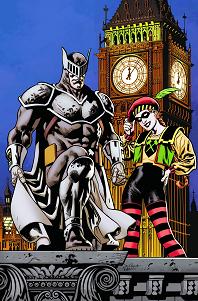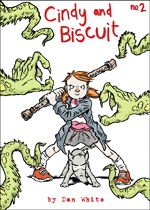Knight and Squire #1 review
October 18th, 2010
 Paul Cornell and Jimmy Broxton
Paul Cornell and Jimmy Broxton
As a British fan of Morrison’s bat-run I was always going to pick this up, and on the whole I’m glad I did. Much has been made of the over-abundance of British cultural references and idiomatic turns of phrase by my American chums, which comes as no surprise given that Cornell’s attempts to paint DC-UK as exotic even forced me to stop and think about some of the dialogue, and that’s despite the glossary at the back of the book. To some extent I feel for those who struggled, this self-evidently isn’t a comic for everyone. If you’re not an anglophile or a Brit who’s prepared to weather what could reasonably described as Cornell’s heavy handed approach to British cultural representation then this isn’t the comic for you. This first issue also isn’t a book for those who want a lot in the way of plot, and what little there is it at least as concerned with servicing Cornell’s primary aim, introducing a milieu, as it is with moving the Knight and Squire’s story forward.
With the above caveats in mind, it’s as an exercise in world building that the book worked for me. I liked the pub where Britain’s super-community meet, as a concept I think it has the scope to stretch out beyond its soapy roots (the British pub sits at the heart of the UK’s two favourite soaps, EastEnders and Coronation Street), and in this issue it served both as an efficient means of condensing the DC-UK fictional landscape and setting the light-hearted tone. I enjoyed the humorous character introductions even if I thought they lacked the creative electricity that a Moore or a Morrison would have imbued them with. Captain Cornwall made me chuckle (the very idea), and I particularly liked the Milk Man, who as a concept managed to straddle the line between being silly, cosily familiar and a bit weird in a satisfyingly pythonesque way (an adjective which could start to wear thin if we’re still trotting it out in two issues time, I grant you). I was also happy to see that Cornell, like Moore before him, is capable of using the more trainspottery elements to bolster his efforts. To have Jarvis Poker ‘the [Great] British Joker’ speak briefly in Polari brought the character to life in one panel thanks to the strong association between comedy, that opaque language of 50s gay culture and the shade of Kenneth Williams.
Broxton’s art, while failing to clearly communicate the mayhem and action towards the end of the book was articulate enough to convey everything that Cornell needed to get across, and managed to be just cartoony enough to reinforce the book’s general feeling of warmth. It’s tricky to do a bar-room brawl and it’s tricky to design and draw a comic that’s heaving at the gutters with new characters. If that sounds like I’m damning him with faint praise that because to some extent I am, but I’m also prepared to give him the benefit of the doubt at this very early stage. As I’ve noted above, this wasn’t a remotely plot heavy issue, and was mainly built from panels introducing new characters and concepts, as a consequence we’ll see how Broxton fairs when he needs to push the story uphill rather than link up a bunch of largely disparate elements in an anarchic pub.
If I have any big worries for this book they’re around the idea that “moderation” is a concept on which to build a superhero comic. Cornell goes to great pains to set-up this idea: the very notion that supervillains and superheroes would share the same drinking establishment requires it*, as does the woolly subplot where a young turk has to choose which side of the hero/villain divide he will stand, as if he were choosing between apples and oranges. While I think moderation has its virtues, and I can see why someone might want to sell it to an American audience (sorry, Americans), moderation isn’t the bedrock of entertaining popular fiction, quite the opposite, and as a guiding principle it runs the risk of feeling very forced. This first issue could afford to be quite self-aware, in fact it benefitted from it, but the same approach might become more of a problem down the road, especially if the plot is unduly effected by such meta-texual concerns, and particularly if those concerns are antithetical to drama.
*At least it does in so far as Cornell’s vision for the pub goes.
I hereby award this comic three brains out of five




Leave a Reply
You must be logged in to post a comment.